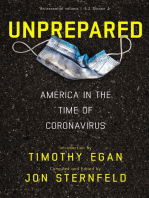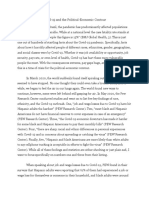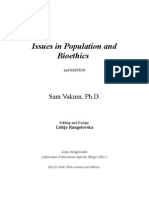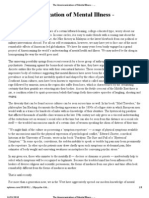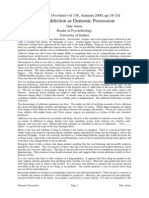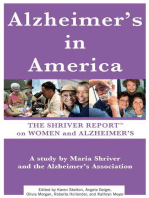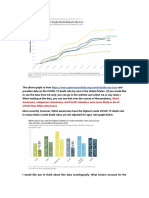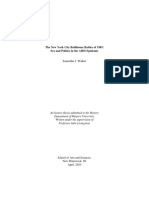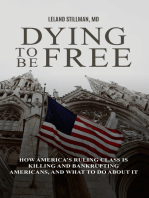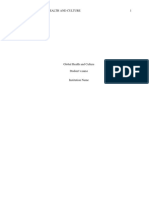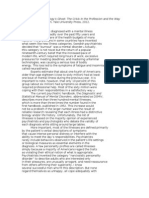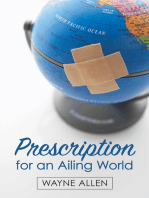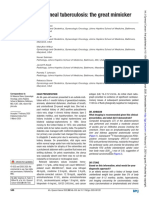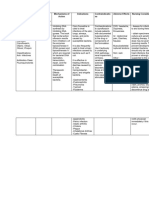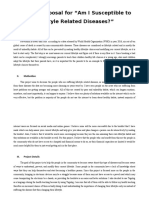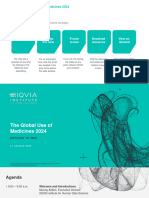Professional Documents
Culture Documents
Unnatural Causes
Unnatural Causes
Uploaded by
Sovia MuspahOriginal Description:
Copyright
Available Formats
Share this document
Did you find this document useful?
Is this content inappropriate?
Report this DocumentCopyright:
Available Formats
Unnatural Causes
Unnatural Causes
Uploaded by
Sovia MuspahCopyright:
Available Formats
Unnatural Causes: Description of series
UNNATURAL CAUSES, a seven part series, sounds the alarm about the
extent of our glaring socio-economic and racial inequities in health and
searches for their root causes. But those causes are not what we might
expect. While we pour more and more money into drugs, dietary
supplements and new medical technologies, UNNATURAL CAUSES
crisscrosses the country investigating the findings that are shaking up
conventional understanding of what really makes us healthy or sick.
UNNATURAL CAUSES is a medical detective story out to solve the
mystery of what's stalking and killing us before our time, especially
those of us who are less affluent and darker-skinned. But its
investigators keep peeling back the onion, broadening their inquiry
beyond the immediate, physical causes of death to the deeper,
underlying causes that lurk in our neighborhoods, our jobs and even
back in history.
The perpetrators, of course, aren't individuals but rather societal and
institutional forces. And theirs are not impulsive crimes of passion.
These are slow deaths the result of a lifetime of grinding wear and tear,
thwarted ambition, segregation and neglect. But this is also a story of
hope and possibility, of communities organizing to gain control over their
destinies and their health.
The good news is that if bad health comes from policy decisions that we
as a society have made, then we can make other decisions. Some
countries already have, and they are living longer, fuller lives as a result.
Episode 1: In Sickness and In Wealth
EPISODE ONE, 56 MINS (SERIES OPENER). What are the connections between healthy bodies,
healthy bank accounts and skin color? Our opening episode travels to Louisville, Kentucky, not to
explore whether medical care cures us, but to see why we get sick in the first place, and why
patterns of health and illness reflect underlying patterns of class and racial inequities.
Episode 2: When the Bough Breaks
EPISODE TWO, 29 MINS The number of infants who die before their first birthday is much higher in
the U.S. than in other countries. And, for African Americans, the rate is nearly twice as high than it is
for white Americans. Even well-educated Black women have birth outcomes worse than white women
who haven't finished high school. Why is this the case? How might the chronic stress of racism over
the life course become embedded in our bodies and increase risks? WHEN THE BOUGH BREAKS
explores this topic.
Episode 3: Becoming American
EPISODE THREE, 29 MINS. Recent Mexican immigrants, although poorer, tend to be healthier than
the average American. They have lower rates of death, heart disease, cancer, and other illnesses,
despite being less educated, earning less and having the stress of adapting to a new country and a
new language. In research circles, this is the Latino paradox.
But as they are here longer, their health advantage erodes. After five years or more in the U.S., they
are 1.5 times more likely to have high blood pressure - and be obese - than when they arrived.
Within one generation, their health is as poor as other Americans of similar income status.
Episode 4: Bad Sugar
EPISODE FOUR, 29 MINS The Pima and Tohono O'odham Indians of southern Arizona have arguably
the highest diabetes rates in the world - half of all adults are afflicted. But a century ago, diabetes
was virtually unknown here. Researchers have poked and prodded the Pima for decades in search of
a biological - or more recently, genetic - explanation for their high rates of disease. Meanwhile,
medical-only interventions have failed to stem the rising tide not just among Native Americans, but
globally. What happened to the health of the Pima? BAD SUGAR explores this topic.
Episode 5: Place Matters
EPISODE 5, 29 MINS Increasingly, recent Southeast Asian immigrants, along with Latinos, are moving
into neglected urban neighborhoods, and their health is being eroded as a result. What policies and
investment decisions create living environments that harm-or enhance-the health of residents? What
actions can make a difference?
Episode 6: Collateral Damage
EPISODE SIX, 29 MINS. In the Marshall Islands, local populations have been displaced from a
traditional way of life by globalization and the American military presence. Now they must contend
with the worst of the "developing" and industrialized worlds: infectious diseases such as tuberculosis
due to crowded living conditions and extreme poverty and chronic disease stemming from the stress
of dislocation and loss.
Episode 7: Not Just a Paycheck
EPISODE SEVEN, 29 MINS Residents of western Michigan struggle against depression, domestic
violence and higher rates of heart disease and diabetes after the largest refrigerator factory in the
country shuts down. Ironically, the plant is owned by a company in Sweden, where mass layoffs - far
from devastating lives - are relatively benign, because of government policies that protect workers
and their communities.
You might also like
- Crazy Like Us: The Globalization of the American PsycheFrom EverandCrazy Like Us: The Globalization of the American PsycheRating: 4.5 out of 5 stars4.5/5 (16)
- Deadly Deception - Robert WillnerDocument303 pagesDeadly Deception - Robert Willnerleocarvalho001_60197100% (8)
- Progress: Ten Reasons to Look Forward to the FutureFrom EverandProgress: Ten Reasons to Look Forward to the FutureRating: 4 out of 5 stars4/5 (50)
- Chronically American: Our Evolution Towards Chronic Illness and Our Radical Way ForwardFrom EverandChronically American: Our Evolution Towards Chronic Illness and Our Radical Way ForwardNoch keine Bewertungen
- A Pest in the Land: New World Epidemics in a Global PerspectiveFrom EverandA Pest in the Land: New World Epidemics in a Global PerspectiveRating: 3.5 out of 5 stars3.5/5 (4)
- Argumentative Essay InequalityDocument3 pagesArgumentative Essay Inequalityapi-302268039Noch keine Bewertungen
- Poisoned NeedleDocument147 pagesPoisoned NeedleMark Cooper100% (3)
- Poisoned NeedleDocument147 pagesPoisoned NeedleAndrea InvencibleNoch keine Bewertungen
- We Shall Be Changed: Questions for the Post-Pandemic ChurchFrom EverandWe Shall Be Changed: Questions for the Post-Pandemic ChurchNoch keine Bewertungen
- Health: Learning Activity SheetDocument48 pagesHealth: Learning Activity SheetGabrielle Tomo88% (8)
- Hangxiety InfographicDocument1 pageHangxiety Infographicapi-548552942Noch keine Bewertungen
- Under the Skin: racism, inequality, and the health of a nationFrom EverandUnder the Skin: racism, inequality, and the health of a nationRating: 4 out of 5 stars4/5 (2)
- The Absurdities of Modern CultureDocument15 pagesThe Absurdities of Modern Culture2aethicusNoch keine Bewertungen
- Getting What We Deserve: Health & Medical Care in AmericaFrom EverandGetting What We Deserve: Health & Medical Care in AmericaNoch keine Bewertungen
- Paper 2 - Political-Economic Contour Anthro ApproachesDocument5 pagesPaper 2 - Political-Economic Contour Anthro Approachesapi-643733353Noch keine Bewertungen
- Pandemic Protection: Safe, Natural Ways to Prepare Your Immune System BEFORE You Need ItFrom EverandPandemic Protection: Safe, Natural Ways to Prepare Your Immune System BEFORE You Need ItNoch keine Bewertungen
- Mboup, Lisa, Unintended Consequences RacismDocument17 pagesMboup, Lisa, Unintended Consequences Racismapi-284513333Noch keine Bewertungen
- Bioethics and PopulationDocument99 pagesBioethics and PopulationSam Vaknin100% (1)
- How Evil Works: Understanding and Overcoming the Destructive Forces That Are Transforming AmericaFrom EverandHow Evil Works: Understanding and Overcoming the Destructive Forces That Are Transforming AmericaRating: 4 out of 5 stars4/5 (5)
- Electronic Torture - Mireilletorjman - Cancer - 911 - CiaDocument209 pagesElectronic Torture - Mireilletorjman - Cancer - 911 - Ciastop-organized-crime100% (2)
- I Will Take You to Broceliande: Threads of Insanity in HumanityFrom EverandI Will Take You to Broceliande: Threads of Insanity in HumanityNoch keine Bewertungen
- Issues in Population and Bioethics: Sam Vaknin, PH.DDocument70 pagesIssues in Population and Bioethics: Sam Vaknin, PH.DLaura CalinNoch keine Bewertungen
- 2010JAN08 The Americanization of Mental Illness - NYTimesDocument8 pages2010JAN08 The Americanization of Mental Illness - NYTimescrljones100% (1)
- Poverty and Culture: SocietyDocument5 pagesPoverty and Culture: SocietyAli Muhtarom LilikNoch keine Bewertungen
- Rebel Bodies: A guide to the gender health gap revolutionFrom EverandRebel Bodies: A guide to the gender health gap revolutionNoch keine Bewertungen
- 5338e852c1d16a275404f12d0cbf7440(2)Document310 pages5338e852c1d16a275404f12d0cbf7440(2)Lesetja GwangwaNoch keine Bewertungen
- The Suicide of A SuperpowerDocument8 pagesThe Suicide of A SuperpowerRotl RotlRotlNoch keine Bewertungen
- Medical Apartheid ReviewDocument2 pagesMedical Apartheid ReviewCrystal TalabiNoch keine Bewertungen
- 6 Casedeaton PDFDocument60 pages6 Casedeaton PDFwulan anugerah sariNoch keine Bewertungen
- Demonic PossessionDocument5 pagesDemonic PossessionAurora RodríguezNoch keine Bewertungen
- The Shriver Report: A Woman's Nation Takes On Alzheimer's: A Groundbreaking Look At This Mind-Blowing Disease And Its Effect On Women As Patients, Caregivers, And AdvocatesFrom EverandThe Shriver Report: A Woman's Nation Takes On Alzheimer's: A Groundbreaking Look At This Mind-Blowing Disease And Its Effect On Women As Patients, Caregivers, And AdvocatesNoch keine Bewertungen
- Soc1 Forum 5Document3 pagesSoc1 Forum 5api-642196012Noch keine Bewertungen
- World War C: Lessons from the Covid-19 Pandemic and How to Prepare for the Next OneFrom EverandWorld War C: Lessons from the Covid-19 Pandemic and How to Prepare for the Next OneRating: 4 out of 5 stars4/5 (11)
- Thesis 2010 WalkerDocument108 pagesThesis 2010 WalkerAramael Andres Pena-AlcantaraNoch keine Bewertungen
- Dying to be Free How America's Ruling Class Is Killing and Bankrupting Americans, and What to Do About It: How America's Ruling Class Is Killing and Bankrupting Americans, and What to Do About ItFrom EverandDying to be Free How America's Ruling Class Is Killing and Bankrupting Americans, and What to Do About It: How America's Ruling Class Is Killing and Bankrupting Americans, and What to Do About ItNoch keine Bewertungen
- Crisis and Chaos: Lessons from the Front Lines of the War Against COVID-19From EverandCrisis and Chaos: Lessons from the Front Lines of the War Against COVID-19Noch keine Bewertungen
- Running Head: Global Health and Culture 1Document4 pagesRunning Head: Global Health and Culture 1Sammy GitauNoch keine Bewertungen
- Invalid Women: Figuring Feminine Illness in American Fiction and Culture, 1840-1940From EverandInvalid Women: Figuring Feminine Illness in American Fiction and Culture, 1840-1940Noch keine Bewertungen
- Iana Seales: Gay Agenda?Document4 pagesIana Seales: Gay Agenda?RogerWilliamsNoch keine Bewertungen
- Brian Elliott - White Coat Ways - A History of Medical Traditions and Their Battle With ProgressDocument185 pagesBrian Elliott - White Coat Ways - A History of Medical Traditions and Their Battle With ProgressBrett CromptonNoch keine Bewertungen
- Guyana: from Slavery to the Present: Vol. 2 Major DiseasesFrom EverandGuyana: from Slavery to the Present: Vol. 2 Major DiseasesNoch keine Bewertungen
- History Science & Tech Surveys Exhibits Specialized: Abortion Affirmative ActionDocument4 pagesHistory Science & Tech Surveys Exhibits Specialized: Abortion Affirmative ActionChoc Sta AnaNoch keine Bewertungen
- Are We SaneDocument5 pagesAre We Saneandres briceñoNoch keine Bewertungen
- The Invisible People: How the U.S. Has Slept Through the Global AIDS PanFrom EverandThe Invisible People: How the U.S. Has Slept Through the Global AIDS PanNoch keine Bewertungen
- Bodies in Protest: Environmental Illness and the Struggle Over Medical KnowledgeFrom EverandBodies in Protest: Environmental Illness and the Struggle Over Medical KnowledgeRating: 3.5 out of 5 stars3.5/5 (1)
- Deaton, Angus (2015) The Great Escape - Health, Wealth, and The Origins of InequalityDocument5 pagesDeaton, Angus (2015) The Great Escape - Health, Wealth, and The Origins of Inequalitypandujb213Noch keine Bewertungen
- Al Jeezerah American Professor OPED 42120Document8 pagesAl Jeezerah American Professor OPED 42120KimNoch keine Bewertungen
- Book Excerpt: 'Psychology's Ghost: The Crisis in The Profession and The Way Back'Document5 pagesBook Excerpt: 'Psychology's Ghost: The Crisis in The Profession and The Way Back'WBURNoch keine Bewertungen
- Crazy Last Days PropheciesDocument100 pagesCrazy Last Days PropheciesHeinz100% (1)
- Death Without WeepingDocument5 pagesDeath Without WeepingLeonardo Gonzalez HerreraNoch keine Bewertungen
- Population (Britanica)Document9 pagesPopulation (Britanica)x2mrsmd9gsNoch keine Bewertungen
- Pelatihan Pembuatan Masker Sebagai Upaya AntisipasDocument6 pagesPelatihan Pembuatan Masker Sebagai Upaya Antisipasmuhammad zakiNoch keine Bewertungen
- ACI Eye Emergency ManualDocument149 pagesACI Eye Emergency ManualAwais AhmedNoch keine Bewertungen
- Lesson Plan MIDocument14 pagesLesson Plan MIAnand Bhawna100% (1)
- Diffuse Pulmonary DiseasesDocument19 pagesDiffuse Pulmonary DiseasessivaNoch keine Bewertungen
- Plabable-Gems-20. Epidemiology Plabable GemsDocument32 pagesPlabable-Gems-20. Epidemiology Plabable GemsKhalid HabibNoch keine Bewertungen
- Christine TayDocument15 pagesChristine TayTay TingNoch keine Bewertungen
- Peritoneal Tuberculosis: The Great Mimicker: Case StudyDocument5 pagesPeritoneal Tuberculosis: The Great Mimicker: Case StudyDumitru RadulescuNoch keine Bewertungen
- ... Drug Study...Document2 pages... Drug Study...Chona FontanillaNoch keine Bewertungen
- Project Proposal For "Am I Susceptible To Lifestyle Related Diseases?"Document4 pagesProject Proposal For "Am I Susceptible To Lifestyle Related Diseases?"Dayan CabrigaNoch keine Bewertungen
- WEEK 16 LABORATORY EXERCISE Special SensesDocument7 pagesWEEK 16 LABORATORY EXERCISE Special SensesGelo AlonzoNoch keine Bewertungen
- Medical Care For SwimmersDocument15 pagesMedical Care For Swimmerswawa.observerNoch keine Bewertungen
- DTFC19 Memo 464 Reiterating of Corresponding Work Related Guidelines Strict Health Measures 2021-08-05 v2Document17 pagesDTFC19 Memo 464 Reiterating of Corresponding Work Related Guidelines Strict Health Measures 2021-08-05 v2Mary Jean Agudilla CaringalNoch keine Bewertungen
- General Measure in The Management of PoisoningDocument43 pagesGeneral Measure in The Management of PoisoningCharlotte Anne Villero TiuNoch keine Bewertungen
- Alternative Medicine - WorksheetDocument9 pagesAlternative Medicine - WorksheetlataomgNoch keine Bewertungen
- The Mysterious Death of Dr. SebiDocument15 pagesThe Mysterious Death of Dr. SebiJason Carter100% (1)
- Problems Associated With Chronic IllnessDocument8 pagesProblems Associated With Chronic IllnessMeryville JacildoNoch keine Bewertungen
- User's Manual For CLEO Patient Monitor - V1 6Document65 pagesUser's Manual For CLEO Patient Monitor - V1 6Tuananh NguyenNoch keine Bewertungen
- June 2019 (IAL) QP - Unit 4 Edexcel Biology A-Level-1Document28 pagesJune 2019 (IAL) QP - Unit 4 Edexcel Biology A-Level-1Ebtihal AlharthiNoch keine Bewertungen
- The Global Use of Medicines 2024Document62 pagesThe Global Use of Medicines 2024zvfymzj74fNoch keine Bewertungen
- Chestgra、 Ph Hl-101: Spirometry SystemDocument2 pagesChestgra、 Ph Hl-101: Spirometry SystemDiep NguyentuanNoch keine Bewertungen
- Hospital: ServicesDocument60 pagesHospital: ServicesChanpreet SinghNoch keine Bewertungen
- Seminar Health Care DeliveryDocument39 pagesSeminar Health Care DeliveryangayarkanniNoch keine Bewertungen
- Uric Acid: (Uricase / Pod Method)Document1 pageUric Acid: (Uricase / Pod Method)Dharmesh Patel100% (3)
- Rogi ParikshaDocument93 pagesRogi ParikshaNaveen100% (1)
- Unit 2 Immunization-1Document52 pagesUnit 2 Immunization-1Muhammad Iqbal HaralNoch keine Bewertungen
- Ulkus Kornea. Pendekatan Diagnostik .IndriyaniDocument13 pagesUlkus Kornea. Pendekatan Diagnostik .IndriyaniAvabel Player 1Noch keine Bewertungen
- Risk Management Midterm ReviewerDocument9 pagesRisk Management Midterm ReviewerPereyra Faith AngeliqueNoch keine Bewertungen
- History Compass - 2022 - Milne Smith - Gender and Madness in Nineteenth Century BritainDocument10 pagesHistory Compass - 2022 - Milne Smith - Gender and Madness in Nineteenth Century BritainLaura MoreiraNoch keine Bewertungen














